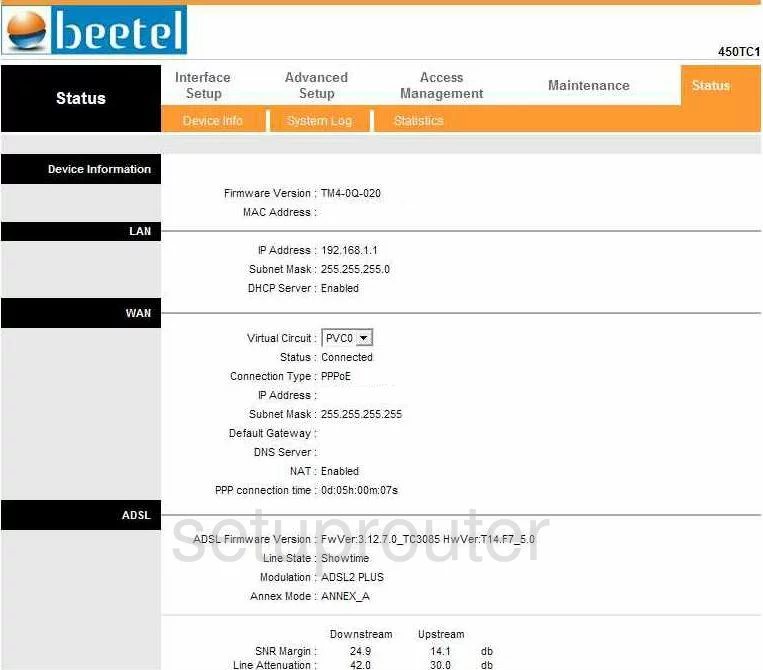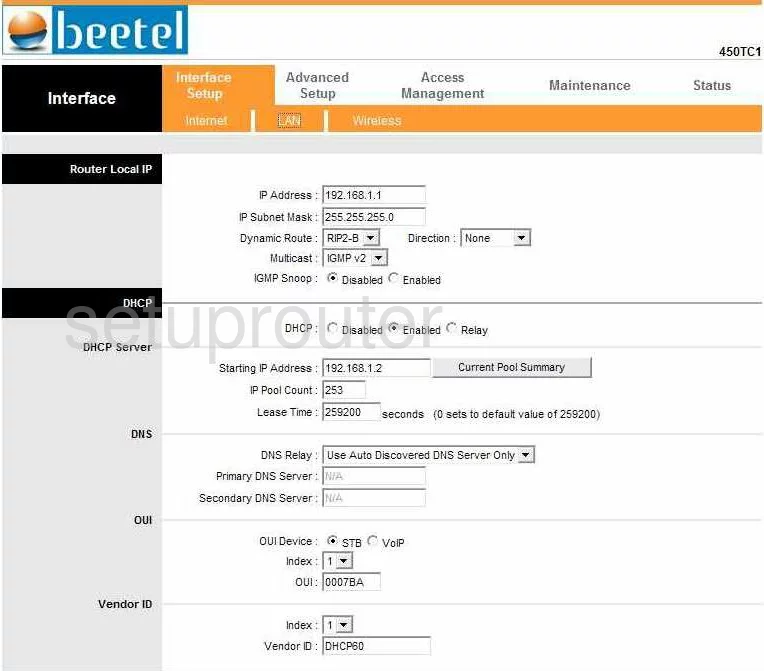This page shows how to change the DNS settings on the Beetel 450TC1 router.
Other Beetel 450TC1 Guides
This is the dns guide for the Beetel 450TC1. We also have the following guides for the same router:
- Beetel 450TC1 - How to change the IP Address on a Beetel 450TC1 router
- Beetel 450TC1 - Beetel 450TC1 Login Instructions
- Beetel 450TC1 - Setup WiFi on the Beetel 450TC1
- Beetel 450TC1 - Beetel 450TC1 Port Forwarding Instructions
- Beetel 450TC1 - How to Reset the Beetel 450TC1
- Beetel 450TC1 - Information About the Beetel 450TC1 Router
- Beetel 450TC1 - Beetel 450TC1 Screenshots
What is the DNS setting on a Router
When you connect a router to the Internet it gets a few settings from your ISP automatically. One of the settings that the ISP sets in your router is the DNS setting. DNS stands for Domain Name System and it is used to convert Internet names into actual IP addresses. For instance, when you go to "google.com", your are really connecting to an IP address that is mapped through DNS to a number such as:
- 173.194.33.73
This mapping happens automatically every time you visit any page on the Internet.
Why Change Your Router's DNS Setting
Some ISPs choose to abuse the DNS system and map unknown names to servers that they control. This can be done in a way that you don't know it is happening since your router is getting its DNS settings from your ISP. For instance, if you have one of these ISPs who is hijacking your DNS, and you try to surf the web to "some-random-site.com" and "some-random-site.com" does not exist, you might get a page back from your ISP with local advertisements on it.
By changing your DNS setting in your router you will effectively change the DNS setting for every computer on your network. This is because when a device is connected to your network your router automatically hands out its own DNS settings to that device. This way you can protect your entire network from ISP hijacking with just one setting.
What Should I Change My DNS To
There are 2 really great DNS servers on the Internet that you can choose from right now: Google Public DNS and OpenDNS. If you are not sure which one to pick then just use Google Public DNS.
When you change the DNS settings in your router, you usually have to enter a Primary and a Secondary setting. The secondary is only used if the primary can not be located. Here are common settings:
If you want to use Google Public DNS, use the following settings:
- Primary: 8.8.8.8
- Secondary: 8.8.4.4
If you want to use OpenDNS, use the following settings:
- 208.67.222.222
- 208.67.220.220
Login To The Beetel 450TC1
To get started configuring the Beetel 450TC1 DNS page you need to login to your router. If you are already logged in you can skip this step.
To login to the Beetel 450TC1, follow our Beetel 450TC1 Login Guide.
Change the DNS settings on a Beetel 450TC1
If you followed our login guide above then you should see this screen.

You should be on the Status page of the Beetel 450TC1 router. First, click the choice at the top of the page titled Interface Setup, then LAN.
Configure the DNS section of your Beetel 450TC1

This takes you to the appropriate page to change your DNS server settings. Look down the left side of the page to find the heading of DNS.
Using the drop down menu labeled DNS Relay pick Use User Discovered DNS Server Only.
In the Primary DNS Server box type in the primary address of the DNS server you have decided on.
Use the Secondary DNS Server box to enter the secondary address of the DNS server you chose.
Click the SAVE button at the bottom of the page and you are finished.
Possible Problems when Changing your DNS settings
Most devices on your network will not begin using the new DNS settings until they have been rebooted. After rebooting a device you can go to it's network settings and verify that it is using the DNS servers that you specified.
Other Beetel 450TC1 Info
Don't forget about our other Beetel 450TC1 info that you might be interested in.
This is the dns guide for the Beetel 450TC1. We also have the following guides for the same router:
- Beetel 450TC1 - How to change the IP Address on a Beetel 450TC1 router
- Beetel 450TC1 - Beetel 450TC1 Login Instructions
- Beetel 450TC1 - Setup WiFi on the Beetel 450TC1
- Beetel 450TC1 - Beetel 450TC1 Port Forwarding Instructions
- Beetel 450TC1 - How to Reset the Beetel 450TC1
- Beetel 450TC1 - Information About the Beetel 450TC1 Router
- Beetel 450TC1 - Beetel 450TC1 Screenshots